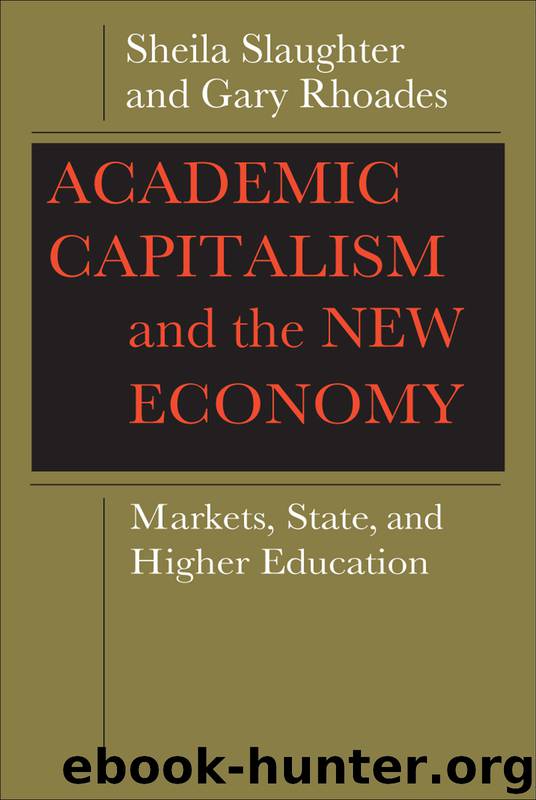Academic Capitalism and the New Economy by Sheila Slaughter

Author:Sheila Slaughter
Language: eng
Format: epub
Publisher: Johns Hopkins University Press
Published: 2004-08-12T16:00:00+00:00
8
ADMINISTRATIVE ACADEMIC CAPITALISM
THE LITERATURE THAT TREATS entrepreneurial universities and intellectual property focuses almost exclusively on faculty activity. Scholars look either at faculty research that leads to intellectual property, new product development, increases in institutional revenue generation, and concomitant economic development, or at faculty participation in distance education and courseware development that brings revenue to institutions. If administrators are considered, they are usually technology licensing officials (Feldman et al. 2002a). University presidents’ part in the development of an academic capitalist regime has not been extensively treated. Yet presidents are now often called university CEOs, indicating that they have management powers similar to corporate CEOs. Colleges and universities could not engage in academic capitalism without the involvement of university presidents, so we decided to explore how they contribute to market behaviors.
We analyze Internet2 as an instructive instance of administrative academic capitalism. The case has all the elements we need to explore administrative academic capitalism. The Internet2 organization includes presidents from most research universities in the United States, letting us see a large number of presidents involved in the academic capitalist knowledge/learning regime. The purpose of the organization is to span the boundary between nonprofit and for-profit sectors, creating commercial opportunity for both, allowing us to observe administrators’ pursuit of market opportunities. The federal government is also a partner in that the Next Generation Internet Act (1998) works in parallel with Internet2 and provides a good deal of the funding that allows university and corporate leaders to achieve their goals. The federal government participation provides an opportunity to see how the state shapes and subsidizes nonprofit and for-profit markets, engaging in a back-door form of economic planning. Faculty perform the necessary research as well as deploy and test the infrastructure, but they are not the drivers, indeed, are usually not even formal members of Internet2. Graduate students are involved because they participate in the research and development necessary to construct Internet2. Undergraduates are central because elements of their education serve as test beds for many Internet2 products and processes.
Several theories have informed our conceptualization of administrative academic capitalism. They are: knowledge economy theory (Bell 1973; Carnoy 1993; Castells 1993, 1996, 1997, 2000; Cohen 1993; Slaughter and Rhoades 1996) aided and abetted by military/industrial/academic theories (Foreman 1987; Greenberg 1967; Melman 1982; Noble 1976;) and theories that deal with the shifting boundary between private and public sectors (Bollier 2002a, 2002b; Coombe 1998; Heller and Eisenburg 1998; McSherry 2001). Each of these treat aspects of the academic capitalism knowledge/learning regime. Knowledge economy theory considers the larger economic shifts that bring universities to the foreground. Military/industrial/academic theories point to the importance of patterns of market, state, and higher education interaction, whereas theories about shifting boundaries between the private and public sectors analyze the social and political construction of boundaries we take as fixed.
These theories deal with knowledge and research but not as they are embodied in universities and colleges as institutions. Knowledge or information economy theory deals primarily with production processes and labor force changes in the
Download
This site does not store any files on its server. We only index and link to content provided by other sites. Please contact the content providers to delete copyright contents if any and email us, we'll remove relevant links or contents immediately.
Life 3.0: Being Human in the Age of Artificial Intelligence by Tegmark Max(5558)
The Sports Rules Book by Human Kinetics(4388)
The Age of Surveillance Capitalism by Shoshana Zuboff(4293)
ACT Math For Dummies by Zegarelli Mark(4049)
Unlabel: Selling You Without Selling Out by Marc Ecko(3663)
Blood, Sweat, and Pixels by Jason Schreier(3625)
Hidden Persuasion: 33 psychological influence techniques in advertising by Marc Andrews & Matthijs van Leeuwen & Rick van Baaren(3566)
The Pixar Touch by David A. Price(3439)
Bad Pharma by Ben Goldacre(3428)
Urban Outlaw by Magnus Walker(3397)
Project Animal Farm: An Accidental Journey into the Secret World of Farming and the Truth About Our Food by Sonia Faruqi(3221)
Kitchen confidential by Anthony Bourdain(3091)
Brotopia by Emily Chang(3056)
Slugfest by Reed Tucker(3004)
The Content Trap by Bharat Anand(2927)
The Airbnb Story by Leigh Gallagher(2857)
Coffee for One by KJ Fallon(2638)
Smuggler's Cove: Exotic Cocktails, Rum, and the Cult of Tiki by Martin Cate & Rebecca Cate(2541)
Beer is proof God loves us by Charles W. Bamforth(2464)
